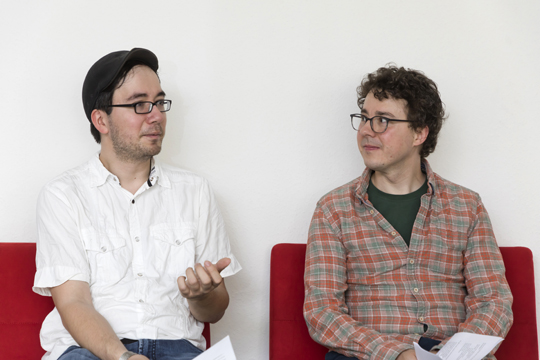Less power, more say
Freiburg, Jun 12, 2019
In theory, it’s simple: anyone who wants to write a good dissertation depends on good doctoral supervisors. But what does that mean in practice? On July 5, 2019, the Freiburg Research Services of the University of Freiburg will organize the “Good Supervision and Leadership in Academia” theme day for doctoral students and postdocs - an opportunity to discuss this question with two participants of the opening panel: Tony Franzky, spokesperson of the Joint Working Committee of the Joint Doctoral Candidate Councils (GAA), and Dr. Andreas Hartmann, junior professor of hydrology at the University of Freiburg, spoke with Jürgen Reuß.

Photo: Marco2811/stock.adobe.com
Mr. Franzky, Mr. Hartmann, there are more people in Germany pursuing a doctorate degree than in nearly any other country. Doesn’t that suggest that things are going well at the universities?
Tony Franzky: Apart from the way things are going, it is common in almost all areas of work to adequately coach leaders to prepare them for their tasks. The University has discovered that it has a lot of catching up to do. And since you are arguing quantitatively: The state has commissioned Baden-Württemberg universities to survey the number of doctoral students - this information was not available until now. In Freiburg, there are almost 4,700 doctoral students.
Andreas Hartmann: And as far as the assessment of quality is concerned, another figure is still missing: that of doctoral students who abandon their doctorates. There are no official surveys, but it is generally assumed that up to 50 per cent of all doctoral students in Germany complete a doctorate. In my opinion, this dropout rate can be significantly reduced with good supervisors.
Couldn’t it just be the doctoral students themselves?
Andreas Hartmann: Some can bring their work to a conclusion independently without any problems. Others can't cope with support at all. About 80 to 90 percent of doctoral students, however, are somewhere in between. They manage their dissertation if they get good supervision.
Tony Franzky: For doctoral students, it is important to be clear about the goal of their work: How do I see my own role, and what expectations do I have of my supervisors? What will be important when I have my doctorate?
Andreas Hartmann: You have to know that only a small percentage of PhDs remain in academia. Five percent make it to a professorship, there is hardly any middle management left. The rest leave academia or go abroad. We are the export world champions in terms of doctoral students. We have to prepare our doctoral students for these conditions so that they can realistically plan their future.
What can be improved?
Andreas Hartmann: Ideally, a supervisor should only accept as many doctoral students as he can conscientiously supervise. You have to make sure that a relationship of trust can develop, which includes a certain amount of minimum contact.
Do you advocate a closer relationship between doctoral students and their parents?
Tony Franzky: It’s not only about a professional maturing process, but also about a personal maturing process. This cannot be achieved if I only see my mentor at the beginning of the topic definition process and at the end of the submission process, and if the three years in between are virtually non-existent.
Andreas Hartmann: We also have a structural problem: the doctoral supervisor is not only the supervisor; he also grades the result and is often also the employer of his doctoral students. This can lead to conflicts of interest.

Promoting professional and personal maturity: Tony Franzky (left) and Andreas Hartmann advocate a closer exchange between doctoral students and their supervisors. Photo: Jürgen Gocke
What could be an alternative?
Andreas Hartmann: In England, for example, a separate committee grades the work. I would also like to see this decoupling for German universities. Postdocs are also allowed to supervise doctoral students there after only one or two years.
Don’t they already do that here?
Andreas Hartmann: Yes, but they can't do it officially. That's conflict-prone. A supervisor can do his job very well, but in the end the professor gives the dissertation a bad mark. That's an unfavorable difference in power. In addition, there is a structural problem: as a young professor, you can still supervise the first five to ten years well. If you are longer at the faculty, your administrative tasks increase and your involvement in research often decreases. Ideally, in such a case the supervision will be shared with postdocs who are more involved in the research. Failure to do so increases the risk of high dropout rates, long doctoral periods and doctoral theses that are not up to date.
Sounds as if the entire university landscape is about to be restructured.
Tony Franzky: Structures cannot be changed overnight. But we can at least give impetus. For example, the University's International Graduate Academy invited the GAA to provide ideas and impulses for the “Compass for Good Supervision.” We have tried to list the hurdles that doctoral students encounter in the course of their doctorates and to recommend improvements.
Which ones, for example?
Tony Franzky: In order to transfer the aforementioned dependency into more regulated relationships, for example, there is now a mandatory supervision agreement that regulates the internal relationship between supervised persons and supervisors. Right from the start, both sides formulate exactly what they expect from each other and how this can best be done.
Andreas Hartmann: Something is happening elsewhere, too. For example, the Young Academy has emphatically voted for departmentalization of the faculties in the funding program for the establishment of one thousand new junior professorships. The idea behind this is to break up the power of the individual professorships and distribute the tasks within the faculty among several small professorships. This means that administrative tasks can be distributed among several people, and one has the opportunity to continue to actively participate in research.
Is that realistic?
Andreas Hartmann: For professorships that have existed for a long time, the step towards a completely new structure is rather unlikely. In fact, many professors have adapted to the abundance of administrative tasks - and the chance of returning to active research decreases the longer one finds oneself in this situation.
Are you hoping for a kind of evolution?
Tony Franzky: A generation of doctoral students is certainly not enough. But there are steps in the right direction. Last year’s amendment to the Higher Education Act stipulated that doctoral candidates will have three representatives in the Senate and one or two representatives on the Faculty Council at the next university elections - with the right to vote. This puts Baden-Württemberg in a pioneering role throughout Germany.
Andreas Hartmann: A lot has also happened in teaching. Every professor has to submit a teaching competence portfolio that is as important as the research portfolio. The next step would be to integrate the development of supervision skills into the agreement on objectives when awarding professorships. However, despite all the structural changes that are needed, one should bear in mind that there is not one true model. Good supervision is an individual process.

